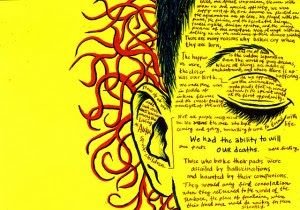My Old Home by Lu Xun (Summary and Analysis)- NEB Grade 12- English
About Author
Lu Xun (1881-1936) is the pen name of the writer born Zhou Shuren. He was born to a family with a strong Confucian background. His grandfather served as a high official in Beijing, and his father was also a scholar. Lu Xun has been considered China's greatest writer in the 20th century. He was a short story writer, essayist, and translator who is commonly considered the ‘father of modern Chinese literature.’ Known for his satirical observations of early 20th-century Chinese society, he is celebrated as a pioneer of modern vernacular Chinese literature and was one of the most important thinkers of his time. His popular novels and short story collections include A Madman's Diary (1918), Kong Yiji (1918), Medicine (1919), Tomorrow (1920), An Incident (1920), The Story of Hair (1920), A Storm in a Teacup (1920), Hometown (1921). The story ‘My Old Home’ is taken from the short story collection Hometown.
About Story
Lu Xun- a young master and the narrator, who went out to purchase a new house
RunTu- former temporary servant of Lu Shun, who is shy in nature and
Mrs. Yang-a neighbor of Lu Xun, who sits in a bean curd shop opposite Lu Xun's home
Hong'er- Lu Shun's timid nephew
Shu Sheng- 5 th son of Runtu
Lu Xun's "My Old Home" tells the story of one's memories, from youth to old age, and the confrontation of the delusions created when memories challenge realities. With the protagonist, Lu Xun's persona, being away from home for so many years, images of glamour, beauty, and respectability framed his childhood, diluting his memories. Upon arriving at his long-past home, his memories are forced to come to terms with the truth, thereby shattering his prior conceptions and understandings of the world.
In the story, Xun had memories of his childhood friends and his hometown. His hometown was lovely and beautiful where the green sky lies above in his childhood. But now, when Xun went back to his old hometown after twenty years, he saw everything was changed. Green sky change into a vast and graying sky: they were drab, desolate, devoid of any semblance of life. There is no sign of progress. His memories deceive him.
"Ah! Surely this was not the old home I had remembered for the past twenty years?" the narrator declared as he stood in front of an old, broken-down home. Having been worn down by weather and inhabitants, alike, the house's old, perceived, splendor was invisible to the eye, only to be seen in that of the mind. Rationalizing the discrepancy between memory and that standing before him, he tried to convince himself that his "home had always been like this, and although it had not improved, it was not so depressing as imagined; it was only his mood that had changed, because he was coming back to the country without illusions". Despite his rationalization, it was clear that his memories had deceived him; having transformed his past home into a grand building it had never been, only to be torn down for re-evaluation along with his other assumed childhood memories that had been built into the magnificent illusions.
After recovering from the shock of seeing his old home, he was informed that his old friend, Jun-Tu, would be returning to town to visit him. Over thirty years had passed since the narrator had last seen his friend, RunTu, and at first, memories were scarce. After pausing for a moment, "a strange picture suddenly flashed into his mind". Stories, ripe from the passing of time, filled the narrator's mind. He was full from the fleshy details he recalled, from the glory of his friend, RunTu's sea-side childhood. Oh, how he wished he could be RunTu. His stories were like candy, appealing to a child and idealized in every way, shape, and form. The narrator could no longer wait to reacquaint himself with Jun-Tu; he wanted to hear more of the sea-side glamour. Upon his long-awaited arrival, the narrator was flustered from anticipation. "RunTu stood there, mixed joy and sadness showing on his face. His lips moved, but not a sound did he utter. Finally, assuming a respectful attitude, he said clearly: "Master! . . ." The narrator's memories had deceived him once again. Had RunTu not been his friend? Had they not played together and shared stories with one another? As a child, the narrator was unable to understand class differentiation. He remembered, due to his childhood naivety, that his time with Jun-Tu was that of a mutual friendship. This memory grew until it reached utopian standards. Their friendship had been perfect, he had believed.
The narrator's childhood was shattered. His house was not as it had seemed. RunTu had not even been his equal, living a glorified, sea-side life. Memories had deceived the narrator, blurring truth, ignoring class boundaries, forgetting the power money possessed. How such a divide could form between himself and Jun-Tu, memories and truth were unfathomable to the narrator. The true fickleness of one's mind and one's memories, of one's past, became apparent. One can not trust one's recollections of the past. The mind changes the past, glorifies it, in order to glorify the individual. By seeing himself as Jun-Tu's equal, the narrator was able to separate himself from the wrongs associated with class differences. His having to face the truth, having to face RunTu, means having to face poverty within China. His memories had provided a means of protection, a way to detach himself from the inequalities Chinese society produced. Only by confronting his memories, by discovering the truth behind the memories, was he able to see the realities of China.




Comments
Post a Comment